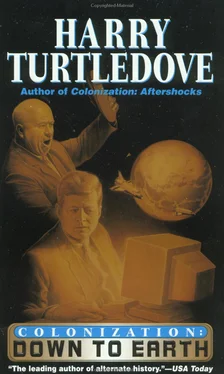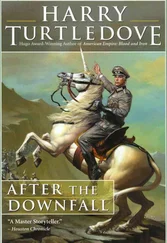When he did go inside, the look on his wife’s face said he hadn’t paused long enough. “It must be bothering you today,” Bertha Anielewicz said.
“Not too bad,” Mordechai insisted. If she believed it, maybe he would, too. “And I did pretty well at the market.” That won a smile from his wife. She wasn’t pretty in any conventional sense of the word, but she turned beautiful when a smile lit up her face. Then, of course, she wanted details.
When he gave them to her, the smile disappeared. He’d known it would. “That’s robbery!” she exclaimed.
“I know,” he said. “It would have been worse robbery if I hadn’t haggled hard. We did need the eggs.”
“We needed the money, too,” Bertha said mournfully. Then she shrugged. “Well, it’s done, and the eggs do look good.” Her smile returned. He smiled back, knowing full well she was letting him down easy.
Vyacheslav Molotov was not happy with the budget projections for the upcoming Five Year Plan. Unfortunately, the parts about which he was least happy had to do with the money allocated for the Red Army.
Since Marshal Zhukov had rescued him from NKVD headquarters after Lavrenti Beria’s coup failed, he couldn’t wield a red pencil so vigorously as he would have liked. He couldn’t wield one at all, in fact. If he made Zhukov unhappy with him, a Red Army-led coup would surely succeed.
Behind the expressionless mask of his face, he was scowling. After Zhukov got all the funds he wanted, the Red Army would in essence be running the Soviet State with or without a coup. Were Zhukov a little less deferential to Party authority, that would be obvious already.
The intercom buzzed. Molotov answered it with a sense of relief, though he showed no more of that than of his inner scowl. “Yes?” he asked.
“Comrade General Secretary, David Nussboym is here for his appointment,” his secretary answered.
Molotov glanced at the clock on the wall of his Kremlin office. It was precisely ten o’clock. Few Russians would have been so punctual, but the NKVD man had been born and raised in Poland. “Send him in, Pyotr Maksimovich,” Molotov said. Dealing with Nussboym would mean he didn’t have to deal with-or not deal with-the budget for a while. Putting things off didn’t make them better. Molotov knew that. But nothing he dared do to the Five Year Plan budget would make it better, either.
In came David Nussboym: a skinny, nondescript, middle-aged Jew. “Good day, Comrade General Secretary,” he said in Polish-flavored Russian, every word accented on the next-to-last syllable whether the stress belonged there or not.
“Good day, David Aronovich,” Molotov answered. “Take a seat; help yourself to tea from the samovar if you care to.”
“No, thank you.” Along with Western punctuality, Nussboym had a good deal of Western briskness. “I regret to report, Comrade General Secretary, that our attempt against Mordechai Anielewicz did not succeed.”
“Your attempt, you mean,” Molotov said. David Nussboym had got him out of his cell in the NKVD prison. Otherwise, Beria’s henchmen might have shot him before Marshal Zhukov’s troops overpowered them. Molotov recognized the debt, and had acquiesced in Nussboym’s pursuit of revenge against the Polish Jews who’d sent him to the USSR. But there were limits. Molotov made them plain: “You were warned not to place the Soviet government in an embarrassing position, even if you are permitted to use its resources.”
“I did not, and I do not intend to,” Nussboym said. “But, with your generous permission, I do intend to continue my efforts.”
“Yes, go ahead,” Molotov said. “I would not mind seeing Poland destabilized in a way that forces the Lizards to pay attention to it. It is a very useful buffer between us and the fascists farther west.” He wagged a finger at the Jew, a show of considerable emotion for him. “Under no circumstances, however, is Poland to be destabilized in a way that lets the Nazis intervene there.”
“I understand that,” David Nussboym assured him. “Believe me, it is not a fate I’d wish on my worst enemies-and some of those people are.”
“See that you don’t inflict it on them,” Molotov said, wagging that finger again: Poland genuinely concerned him. “If things go wrong, that is one of the places that can flash into nuclear war in the blink of an eye. It can-but it had better not. No debt of gratitude will excuse you there, David Aronovich.”
Nussboym’s features were almost as impassive as Molotov’s. The Jew had probably learned in the gulag not to show what was on his mind. He’d spent several years there before being recruited to the NKVD. After a single tight, controlled nod, he said, “I won’t fail you.”
Having got the warning across, Molotov changed the subject: “And how do you find the NKVD these days?”
“Morale is still very low, Comrade General Secretary,” Nussboym answered. “No one can guess whether he will be next. Everyone is fearful lest colleagues prepare denunciations against him. Everyone, frankly, shivers to think that his neighbor might report him to the GRU.”
“This is what an agency earns for attempting treason against the workers and peasants of the Soviet Union,” Molotov said harshly. Even so, he was disquieted. He did not want the GRU, the Red Army’s intelligence arm, riding roughshod over the NKVD. He wanted the two spying services competing against each other so the Party could use their rivalry to its own advantage. That, however, was not what Georgi Zhukov wanted, and Zhukov, at the moment, held the whip hand.
“Thank you for letting me continue, Vyacheslav Mikhailovich.”
Nussboym got to his feet.
“I won’t take up any more of your time.”
He used another sharp nod, then left Molotov’s office. Molotov almost wished he’d stayed longer. Anything seemed preferable to returning to the Five Year Plan.
But then the intercom buzzed again, and Molotov’s secretary said, “Comrade General Secretary, your next appointment is here: the ambassador from the Race, along with his interpreter.”
Next to confronting an irritable Lizard-and Queek was often irritable-the Five Year Plan budget suddenly looked alluring. Bozhemoi! Molotov thought. No rest for the weary. Still, his secretary never heard the tiny sigh that fought its way past his lips. “Very well, Pyotr Maksimovich,” he answered. “I will meet them in the other office, as usual.”
The other office was identical to the one in which he did most of his work, but reserved for meetings with the Race. After he left it, he would change his clothes, down to his underwear. The Lizards were very good at planting tiny electronic eavesdropping devices. He did not want to spread those devices and let them listen to everything that went on inside the Kremlin: thus the meeting chamber that could be quarantined.
He went in and waited for his secretary to escort the Lizard and his human stooge into the room. Queek skittered in and sat down without asking leave. So did the interpreter, a stolid, broad-faced man. After the ambassador spoke-a series of hisses and pops-the interpreter said, “His Excellency conveys the usual polite greetings.” The fellow had a rhythmic Polish accent much like David Nussboym’s.
“Tell him I greet him and hope he is well,” Molotov replied, and the Pole popped and hissed to the male of the Race. In fact, Molotov hoped Queek and all his kind (except possibly the Lizards in Poland, who shielded the Soviet Union from the Greater German Reich) would fall over dead. But hypocrisy had always been an essential part of diplomacy, even among humans. “Ask him the reason for which he has sought this meeting.”
He thought he knew, but the question was part of the game. Queek made another series, a longer one, of unpleasant noises. The interpreter said, “He comes to issue a strong protest concerning Russian assistance to the bandits and rebels in the part of the main continental mass known as China.”
Читать дальше












